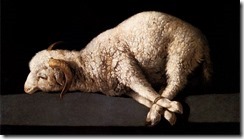Athanasius, Bishop of Alexandria (296 – 373)
 “The Word, being the Image of the Father and immortal, took the form of the servant, and as man underwent for us death in His flesh, that thereby He might offer Himself for us through death to the Father . . . Formerly the world, as guilty, was under judgment from the Law; but now the Word has taken on Himself the judgment, and having suffered in the body for all, has bestowed salvation to all.” Arianos I.41,60
“The Word, being the Image of the Father and immortal, took the form of the servant, and as man underwent for us death in His flesh, that thereby He might offer Himself for us through death to the Father . . . Formerly the world, as guilty, was under judgment from the Law; but now the Word has taken on Himself the judgment, and having suffered in the body for all, has bestowed salvation to all.” Arianos I.41,60
“But beyond all this, there was a debt owing which must needs be paid; for, as I said before, all men were due to die. Here, then, is the second reason why the Word dwelt among us, namely that having proved His Godhead by His works, He might offer the sacrifice on behalf of all, surrendering His own temple to death in place of all, to settle man’s account with death and free him from the primal transgression. In the same act also He showed Himself mightier than death, displaying His own body incorruptible as the first-fruits of the resurrection.” De Incarnatione, 20
“Now as to the season spoken of, he will find for certain that, whereas the Lord always is, at length in fullness of the ages He became man; and whereas He is Son of God, He became Son of man also. And as to the object he will understand, that, wishing to annul our death, He took on Himself a body from the Virgin Mary; that by offering this unto the Father a sacrifice for all, He might deliver us all, who by fear of death were all our life through subject to bondage.” De Decretis, 14
Leave a Reply
You must be logged in to post a comment.